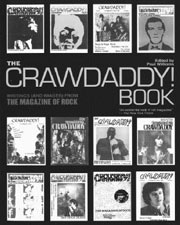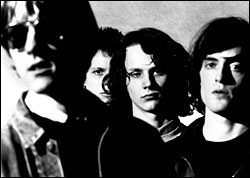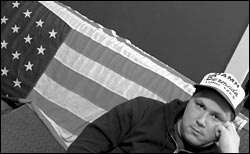DOES THE WORLD really need another indie label? Ask local manager/music publicist Barbara Mitchell (aka Deluxxe Media & Management), and there’s no question about it. She’s just started her own imprint, Roslyn Recordings, and in a rare instance of understatementmusic biz folks who regularly receive Mitchell’s overcaffeinated PR missives take note observes succinctly, “I’m really excited.”
More about the label in a sec. First, let’s look at the fledgling imprint’s double-shot debut.
MARC OLSEN’S Brighter When is the former Sky Cries Mary/Sage guitarist’s third solo album and easily his most accomplished. His forceful vocals wander the same fluorescent-lit alleyways as Mark Lanegan’s (with whom Olsen has toured) but are pitched higher, closer to Neil Young or Chris Whitleyon the alternately raging/soothing title track, he even recalls Whitley’s early Dan Lanois-produced big-sky ramblings.
Reviewers seem to want to peg Olsen along Americana lines, but in truth he seems closer to the open-ended sonic cinema as practiced by groups like Calexico, Scenic, and Nick Cave’s Bad Seeds. Consider, for example, the hissing percussion and Latin-cum-surf-guitar licks of the mysterious, expansive “To Hear Laughter” or the atmospheric keyboard motifs of the desolate “Disarray.” The best song, though, is one of the least adorned: Closing cut “I Found a Reason,” with its gospelish vocals and sparse, unhurried arrangement, is a waltzing slice of soul-pop whose forward-looking message”I do believe/If you don’t like things, you leave/For some place/You’ve never gone before”is as bravely optimistic as anything you’ll hear all year.
Despite the huge shadow cast by Steve Turner’s main gig, Mudhoney, his solo debut, Searching for Melody, doesn’t require a leap of faith on the listener’s part. Against a contemporary backdrop of Black Keys, White Stripes, and N.Y.C.’s anti-folk movement, Turner’s punk-blues/rebel-folk strum und twang is a natural fit.
With local pals Stone Gossard, Dan Peters, and Johnny Sangster (on bass, drums, and guitar/keyboards, respectively) backing him up, Turner transmutes a long-nurtured love of folk music. Aside from an a cappella reading of folkie Dave Van Ronk’s boozy sign-off “Last Call,” however, Turner doesn’t genuflect excessively at the American Folkways altar. Singing in a gritty, drawl/ quaver-lined wail like he’s Peter Case’s first cousin, Turner brings a basement rocker’s sensibility to his projectand a number of tunes, while sparsely laid out, would only need a Marshall and a Big Muff to slot into a Mudhoney set list. High points include the funereal, organ-adorned “Nothing but the Blues,” the ’50s-ish good-time shuffle “Not Only You,” and an unexpected cover of Seattle punk legends the Macs Band’s creepy “I’m 37,” here rendered as a neo-gothic minimalist blooze moan. And the mostly acoustic, modal-tinged “Smart Operator,” about a loser who’s “a slave to the past, doomed to repeat it,” brings to mind the genre-bending Brit folk/ American blues experiments of early Quicksilver Messenger Service (present, in fact, are some licks eerily reminiscent of QMS’s late guitarist John Cipollina). It’s a haunting, potent number that resonates in your mind long after the record has spun.
AS NOTED EARLIER, Barbara Mitchell’s java-soaked enthusiasm toward the artists she works with is legendary. She’s also one of a mere handful of national publicists whose pitches don’t immediately make me roll my eyes. I sold high-end men’s shoes for 10 years, and as the saying goes, you can’t bullshit a bullshitter; when Mitchell tells me I’ll look marvelous in my brogans and clutching that disc she just sent me, I believe her because she’s rarely steered me wrong.
“WowI didn’t mean to start a label,” explains Mitchell, fielding the obvious question. “It was more a matter of frustration. I was managing Steve, and we weren’t having any luck finding a label for his album here in the States. We were eating cheap Mexican food and talking about things, and he suggested that if nothing really came up he would perhaps resurrect his label, Super Electrobut that he really didn’t want to put out his own record. That’s when I piped in with, ‘Dammit, if someone would only give me some money, I know exactly how I’d do things. . . . ‘ And the conversation kind of took off from there.”
In a stroke of coincidence, later that night Mitchell ran into an acquaintance who, intrigued by her brainstorm, committed to help fund the enterprise as a silent partner. Mitchell was also managing Olsen, and as he was on the verge of issuing Brighter When on Burn Burn Burn, the decision was made to make it a joint release between the two labels.
Mitchell is quick to point out that having worked with numerous other Northwest artists over the years, launching Roslyn under a distinct community banner was only logical.
“It’s like I just connected some dots where things were already happening more than anything else,” she says. “Maybe the label is just the official version of the community. It’s a bunch of my really talented friends who all like and respect each other and play together and could go on the road together and have a great time.”
And the choice of label moniker? Roslyn, of course, is the tiny central Washington town of Northern Exposure fame, and one of Mitchell’s favorite bars, the Brick, is located there. Not long after a particularly debauched night of rock ‘n’ roll in Roslyn involving members of Goldenboy, the Souvenirs, and the Posies, Mitchell, Olsen, and Turner were making plans for a return visit. Recalls Mitchell, “Since Steve was going to play this time, he wrote on a note to himself to ‘record Roslyn.’ But when I looked across the table at the words, they turned themselves into ‘Roslyn Records,’ and it just made sense. It embodied the feel of community and talentso it stuck.”








